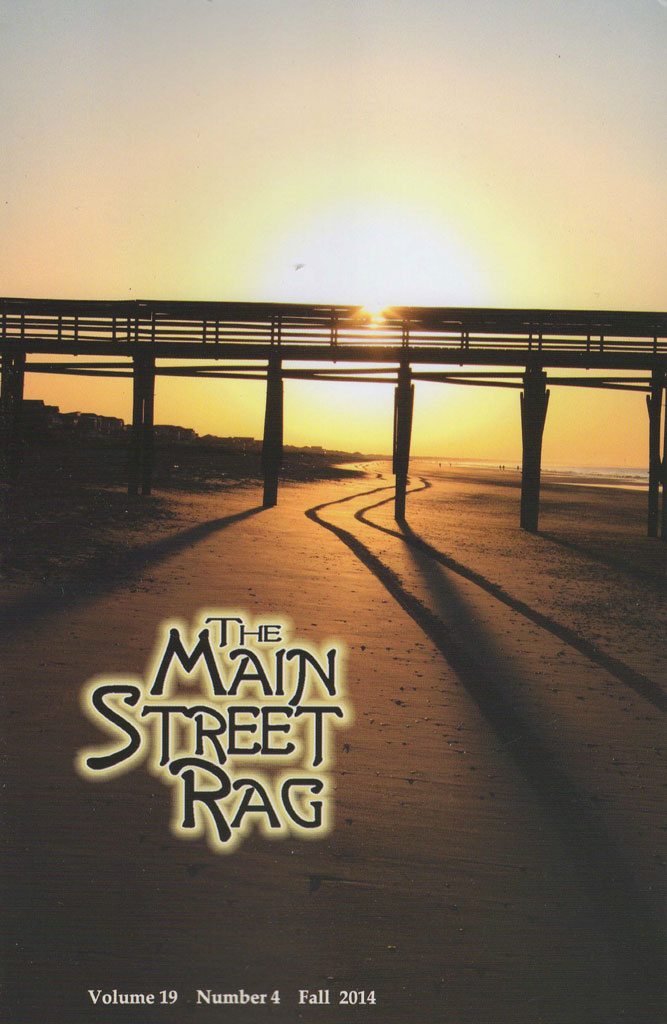Main Street Rag – Fall 2014
The Main Street Rag has a different vibe from your distantly intellectual, even-tempered literary journal. It’s unpredictable, quirky. At the very beginning, Publisher/Editor M. Scott Douglass writes in The Front Seat column about why the issue is late and about the kerfuffle of the North Carolina governor inserting himself into the selection of state poet laureate. When he’s had his say on these topics, he directs us to The Back Seat (distinguished by cream-colored pages) toward the end of the issue, where he takes on the U.S. Senate race in North Carolina. This is a hands-on, opinionated rag. The Main Street Rag has a different vibe from your distantly intellectual, even-tempered literary journal. It’s unpredictable, quirky. At the very beginning, Publisher/Editor M. Scott Douglass writes in The Front Seat column about why the issue is late and about the kerfuffle of the North Carolina governor inserting himself into the selection of state poet laureate. When he’s had his say on these topics, he directs us to The Back Seat (distinguished by cream-colored pages) toward the end of the issue, where he takes on the U.S. Senate race in North Carolina. This is a hands-on, opinionated rag.
Lisa Zerkle’s interview with Joseph Bathanti, the state’s 2012 poet laureate, dovetails with the above concerns. Although Bathanti is from Pittsburgh, his literary career has deeply embedded him in the cultural life of North Carolina ever since he arrived as a VISTA volunteer in 1976. Two accompanying excerpts show his familiarity with his adopted environment: first, the poem, “Copperhead,” from his collection, Anson County:
The dogs have seen a ghost.
They dance around the demon,
barking with dread at the sexless coils,
the switchblade tongue
And second, a passage from his novel Coventry viscerally describing a boy killing a snake. In “The Footlocker,” from his collection Concertina, he recalls leaving home for the South. Zerkle’s interview shows why Bathanti is so valuable as an ambassador of writing throughout North Carolina. “Everywhere there’s a library with a librarian standing there with her flaming word. They still believe in books,” he declares of the many places he’s visited to promote poetry.
The journal is a good introduction to the kinds of books Main Street Rag Publishing Company brings out. Lucia Cherciu, whose Edible Flowers will be published this month, has five poems in this issue. Cherciu writes to us from a far-off country, bringing to life a time and place we know only hazily from the news. In “Night Watchman During Communism”:
The frost cut through his heavy clothes,
layers he piled up, ice sewn into the fibers
of his overcoat, face left unshaved for warmth
In “Only Two Minutes from the House”:
Luxuriant chicory was growing
like an eye of water and sky
that opened to the final mysterywhere they found my father
on the side of the road.
The selections come from all over the country and vary in tone. Ann Howells’s poem “The Blood-Red Eye” is larded with Spanish phrases and Spanglish ( “. . . [he] paused to watch un camión discharge los soldados . . .”), an effective strategy for describing a man’s visit to “Mexico, su casa segunda.” Each of the six spare poems by Betsy Johnson-Miller pays sacramental attention to the world, as in “[Do Not Ignore]”:
adorn your body with star
hand-picked from a blizzardroll in the dirt
to thank the horse
of your heart
MSR does not shy away from humor, often lacking in literary magazines. Jerome Richard’s story “Muriel’s Gypsy” introduces Muriel Bingham, whose marriage to Marty, a telephone company salesman, leaves her “feeling like one of life’s spectators.” Marty’s not a traveler, so Muriel starts traveling alone. Eventually she lands in Madrid, where her adoption of a new persona leads her to find her soulmate where she least expects one to turn up. And then there’s Mike James’s “Penis Poem,” amusing if predictable in the working out of the metaphor.
Pathos appears as well, for example, in Jim Scutti’s “Big Mike Shea,” the story of a boy’s groping towards acceptance of psychic pain after his younger brother is killed in a car-bicycle accident that is his fault. Margaret Benbow’s Catholic Gothic story “Maera’s Day” follows the mysterious Juan Maera around town. Juan is a man with a creepy relationship to grocery store fruit (“He weighed little melons in his hands, and tweaked their tips”) and he’s easy to dislike, as several townspeople do. But as his sadly circumscribed story unfolds, our allegiances are undone by the complexity of intersecting relationships.
The book review section (blue pages) showcases small press books many readers would have no other way of learning about, some from well-known literary presses like Algonquin and Copper Canyon, others from boutique-sized southern presses.
Although the journal accepts essays, there are none in this issue. Four landscape photographs comprise the artwork. Why one page of the table of contents is designated “Parking Spaces” and one “Passenger List” was unclear to me. The MSR says it welcomes all kinds of writing, and it really does. Daring and fun.
[www.mainstreetrag.com]





